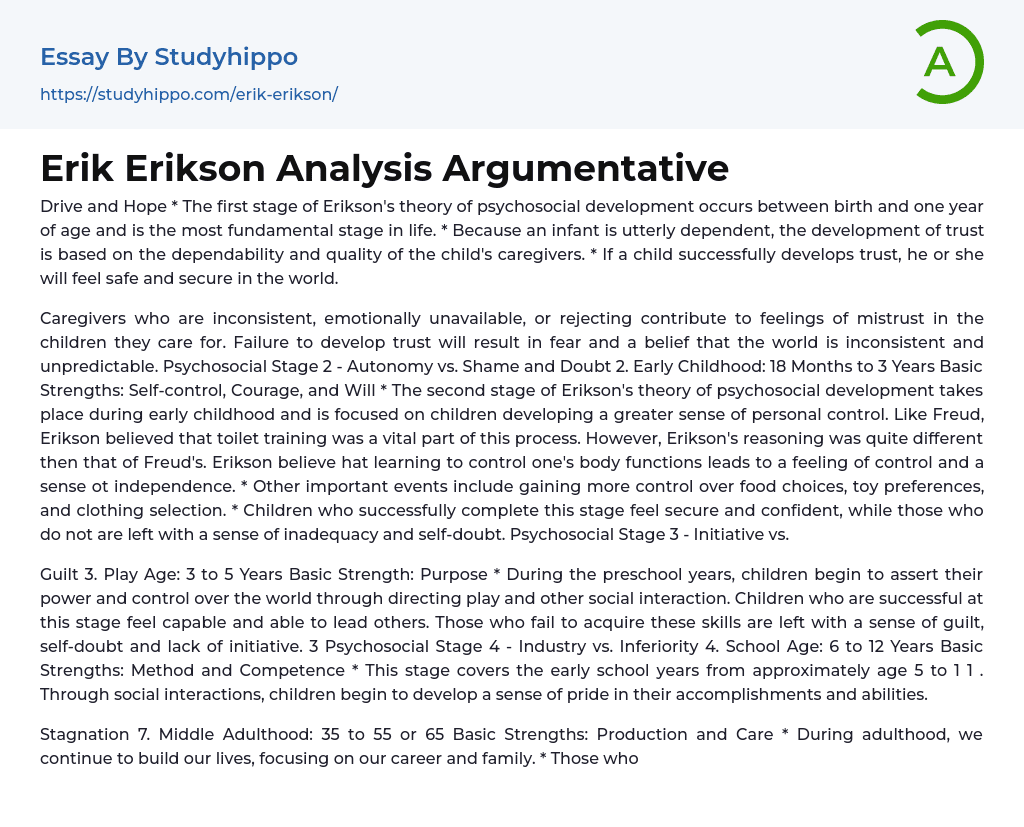Drive and Hope * The first stage of Erikson's theory of psychosocial development occurs between birth and one year of age and is the most fundamental stage in life. * Because an infant is utterly dependent, the development of trust is based on the dependability and quality of the child's caregivers. * If a child successfully develops trust, he or she will feel safe and secure in the world.
Caregivers who are inconsistent, emotionally unavailable, or rejecting contribute to feelings of mistrust in the children they care for. Failure to develop trust will result in fear and a belief that the world is inconsistent and unpredictable. Psychosocial Stage 2 - Autonomy vs. Shame and Doubt 2. Early Childhood: 18 Months to 3 Years Basic Strengths: Self-control, Courage, and Will * The second stage of Erikson's theory of psychosoci
...al development takes place during early childhood and is focused on children developing a greater sense of personal control. Like Freud, Erikson believed that toilet training was a vital part of this process. However, Erikson's reasoning was quite different then that of Freud's. Erikson believe hat learning to control one's body functions leads to a feeling of control and a sense ot independence. * Other important events include gaining more control over food choices, toy preferences, and clothing selection. * Children who successfully complete this stage feel secure and confident, while those who do not are left with a sense of inadequacy and self-doubt. Psychosocial Stage 3 - Initiative vs.
Guilt 3. Play Age: 3 to 5 Years Basic Strength: Purpose * During the preschool years, children begin to assert their power and control over the world
through directing play and other social interaction. Children who are successful at this stage feel capable and able to lead others. Those who fail to acquire these skills are left with a sense of guilt, self-doubt and lack of initiative. 3 Psychosocial Stage 4 - Industry vs. Inferiority 4. School Age: 6 to 12 Years Basic Strengths: Method and Competence * This stage covers the early school years from approximately age 5 to 1 1 . Through social interactions, children begin to develop a sense of pride in their accomplishments and abilities.
Stagnation 7. Middle Adulthood: 35 to 55 or 65 Basic Strengths: Production and Care * During adulthood, we continue to build our lives, focusing on our career and family. * Those who are successful during this phase will feel that they are contributing to the world by being active in their home and community. Those who fail to attain this skill will feel unproductive and uninvolved in the world. Psychosocial Stage 8 - Integrity vs. Despair 8. Late Adulthood: 55 or 65 to Death Basic Strengths: Wisdom * This phase occurs during old age and is focused on reflecting back on life. Those who are unsuccessful during this phase will feel that their life has been wasted and will experience many regrets. The individual will be left with feelings of bitterness and despair. * Those who feel proud of their accomplishments will feel a sense of integrity. Successfully completing this phase means looking back with few regrets and a general feeling of satisfaction. These individuals will attain wisdom, even when confronting death. How the theory apples to the age group in terms of
socialization, development or both
- Abnormal Psychology essays
- Abraham Maslow essays
- Attachment Theory essays
- Authority essays
- Behaviorism essays
- Classical Conditioning essays
- Cognitive Psychology essays
- Counseling essays
- Developmental Psychology essays
- Educational Psychology essays
- Erik Erikson essays
- Family Therapy essays
- Jean Piaget essays
- Maslow's Hierarchy Of Needs essays
- Mental Health essays
- Operant Conditioning essays
- Personality Psychology essays
- Positive Psychology essays
- Psychoanalysis essays
- Psychotherapy essays
- Sigmund Freud essays
- Social Psychology essays
- Stanford Prison Experiment essays
- Supersize Me essays
- American Dream essays
- Barriers To Entry essays
- Capitalism essays
- Central Bank essays
- Compensation essays
- Consumerism essays
- Economic Development essays
- Economic Growth essays
- Economic Inequality essays
- Economic System essays
- Economy essays
- Employment essays
- Export essays
- Finance essays
- Free Trade essays
- Gross Domestic Product essays
- Human Development essays
- Income Inequality essays
- Industry essays
- Inflation essays
- International Business essays
- International Trade essays
- Macroeconomics essays
- Materialism essays
- Max Weber essays
- Microeconomics essays




